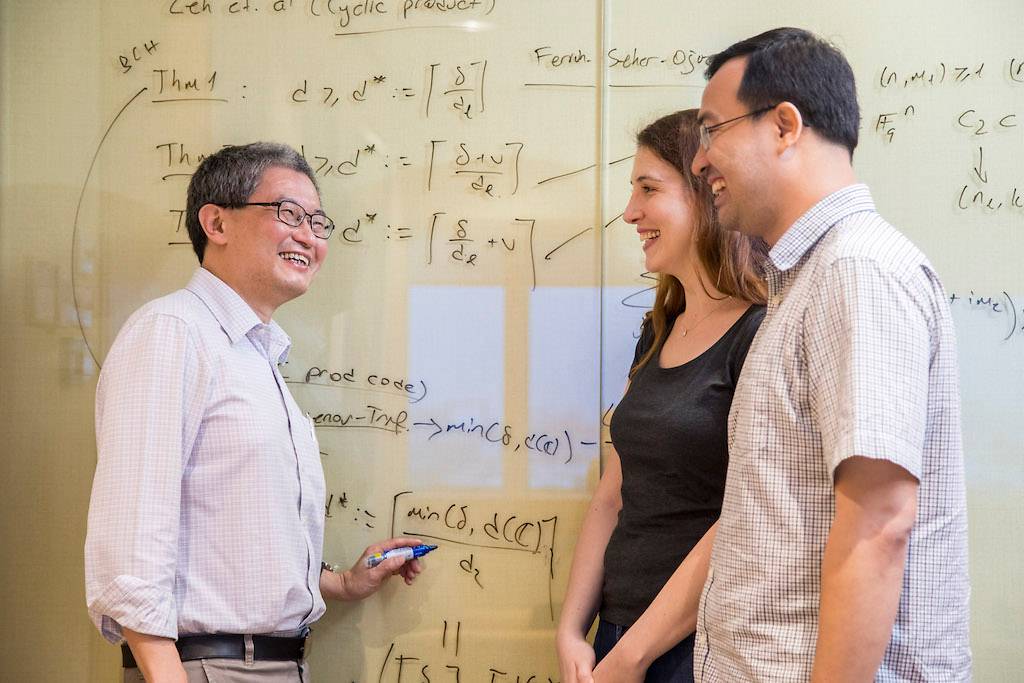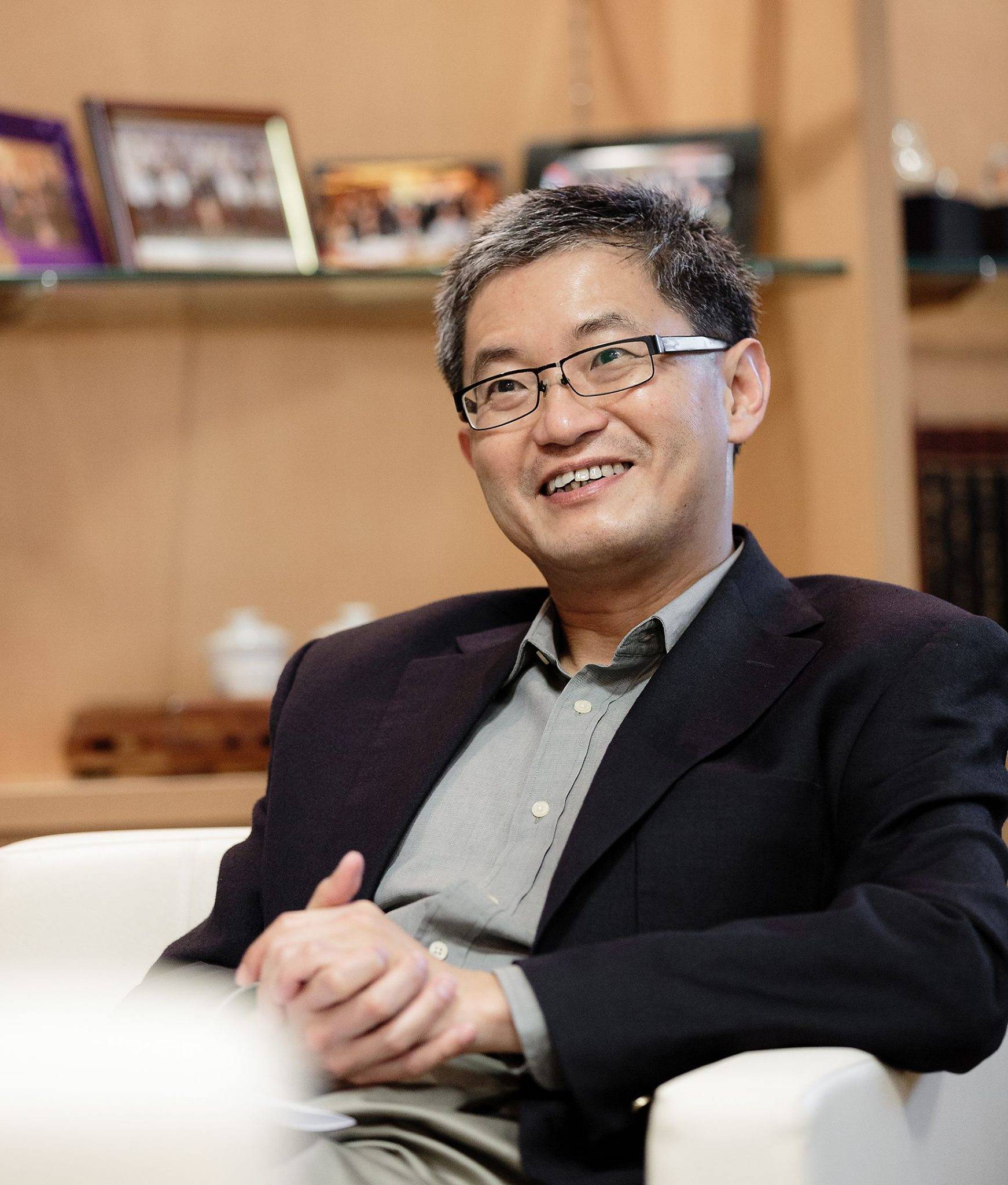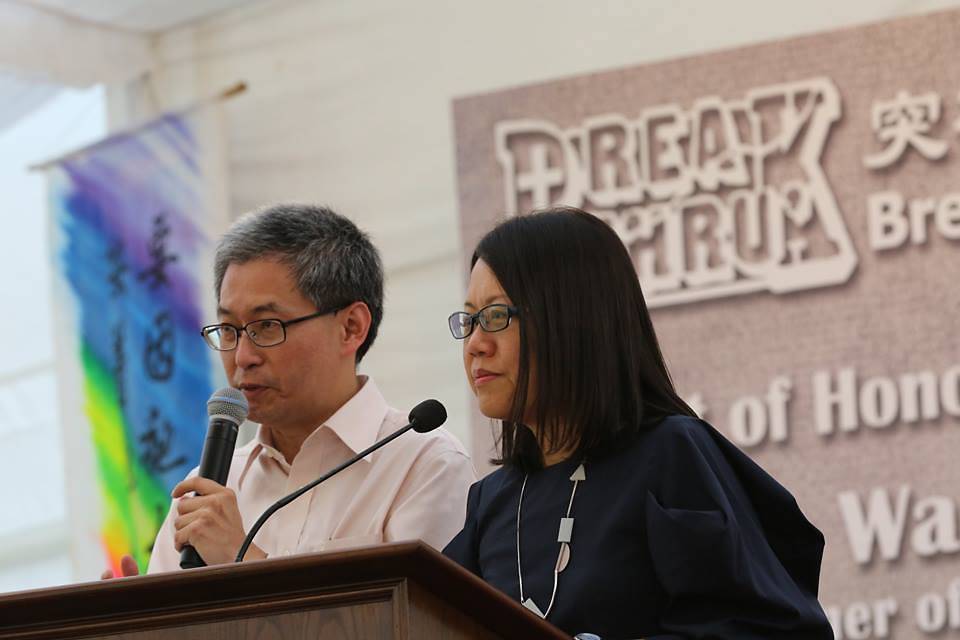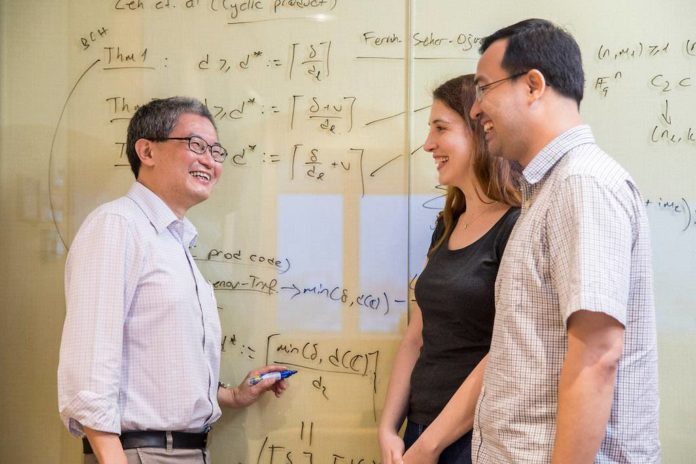SINGAPORE: You would think as provost of one of the top local public universities, Professor Ling San would use any conversation about education to extol the virtues of a university education.
He does.
But he also spends a large part of our conversation urging a redefinition of success and an appreciation of multiple educational pathways.
Currently also Vice President (Academic) at Nanyang Technological University (NTU), the Professor of Mathematical Sciences spent 13 years at the National University of Singapore.
At first glance, he appears to be a typical staid math professor, but as we talk it becomes apparent that he is an advocate of risk-taking and experimentation.
“Take a course that’s totally outside your comfort zone. Do something that you know you have never done before, you haven’t the slightest confidence that you’re going to succeed in, but just give it a try anyway. When you’re forced out of your comfort zone, you’ll have to find ways to survive and maybe even overcome the situation. If the individual is very risk-averse and chooses to stick to a very narrow path, then the opportunity to learn is lost,” he says.
Universities here are incrementally encouraging this by offering inter-disciplinary courses which he says should be made compulsory for all students.
“When I was the Dean of Science, I had to speak to freshman at the orientation every year and for several years, I gave them one piece of advice only and that was: Make sure you fail.
“The intention is to drive home the point that it’s not about getting your As. It’s not about succeeding all the time. In fact the university is one of the best places and best periods of your lives where you can comfortably afford to fail and learn. It is like a laboratory.
“Most of the time, you’ll be surprised, right? You may actually thrive and enjoy that whole process. You might even find a new passion,” his eyes lighting up behind his glasses as he says this.
TAKING RISKS
While he encourages risk-taking in education, I wonder if he has taken any risks in his own career.
One of the riskiest things he had to do in his career was leaving the National University of Singapore (NUS) to join NTU, he says.
I remark it hardly seems like a risk.
“But for me, it was. I was very comfortable and very happy at NUS.”
He explains it was tough primarily because he was brought in to NTU to set up a new entity from scratch – the Division of Mathematical Sciences.
“I sounded out one colleague and said, ‘I’m going over, would you like to join me?’ After a couple of weeks he said, ‘I don’t have the guts.’ It was only then that I realised it’s not as simple as I imagined it to be. Nonetheless, I took the plunge.”
He went from being a deputy head of a department to being a founding head of a department.
It might seem like a modest risk, but to him it was an “experiment” that he could have declined.
“I learnt that this is a once-in-a-lifetime experience to set up new systems and set the tone. Eventually, I had no time to think whether I was scared. I was really driven more by the excitement of the possibility of shaping something, leaving my mark on it.”
As we talk about his career, he is quick to point out that it’s a result of following his passion. He realised his love for maths in secondary school.
He asserts that today, more and more, Singapore’s education system is moving towards helping individuals discover their passions and giving students enough room to “play and to explore”.
However, I point out many remain sceptical as the weight of doing well in exams could lead to disillusionment for many.
He himself wishes his time in university had been less exam-focused.
“I went through the British system. It was exams for six hours a day over two days and if you did badly, your life was over. It was cruel. Your entire years’ work hinged on the two days. So I’m thankful that our system today is not like that.”
But the 54-year-old admits that he grew up in Singapore during a time when the education system was less exacting than it is today.
“We hardly spent time on assessment books. We did our homework and the rest of the time was spent exploring whatever else we might be interested in.”
This is what he says needs to be re-injected into the system.
DOES THE SCHOOL YOU GO TO REALLY NOT DEFINE YOU?
“I can’t help but think that sometimes the academic demands come not from the system, but from the parents or peers. Parents define success as their kid going to a particular school. But success should not be so narrowly defined. In the larger scheme of life, what’s the difference between going to school A and school B? Maybe not even visible at the end.”

“Education should have at least two key aspects to it. One is to prepare the person for a job or at least for working life, but the other actually is to help a person lead a more meaningful and purposeful life,” says Professor Ling San. (Photo: NTU)
But is that really so?
I point to the latest Private Education Institution Graduate Employment Survey that showed less than half of private school students found full-time jobs within six months of their graduation.
In contrast, the full-time permanent employment rate for the autonomous universities – NUS, NTU and Singapore Management University (SMU) – was 78.4 per cent.
The survey also showed that the median gross monthly salary of private school graduates working in full-time jobs was S$2,650, while that of fresh autonomous university graduates was S$3,400.
“Having gone to a brand name university, you may have an advantage at your first job but thereafter, it’s all dependent on your performance. I’ve come to believe that. I’ve seen in a lot of success stories from people who never went to brand name schools or universities and they’ve been doing fabulously well, surpassing their peers later on in life.
“Don’t lose courage. Take this as an opportunity to build up your character and be more resilient.”
It does seem unfair though that individuals are judged in this manner to begin with.
“Life isn’t always fair. But even this group of people who judge, I think, may be evolving in the way they think. Of course it’s easier to use a recognised degree as a proxy for the kind of qualities an employer is looking for. But they must start asking more exact questions like ‘Does this person have the suitable qualities to succeed in this job?’ Increasingly I’m hearing some employers talk about competencies such as soft skills, team work, problem-solving skills, communication.”
If it were up to him, he’d look at what the student has done in terms of augmenting his academic education. There’s no need to get straight As. In fact, he says “mediocre results” are acceptable if someone has spent time on programmes and activities that have helped him build soft skills.
Universities themselves are opening up more places under the discretionary admission scheme to consider students’ qualities aside from their grades.
He emphasises that employers need to “stop using grades or qualifications as a convenient proxy for competence.”
“I think the civil service is trying to change things a little bit but a bolder approach could send a very strong message. I reckon that the civil service is very big so it’s challenging for the entire civil service to try to do things in an unconventional way.”
He urges a “nuanced approach” to sifting through resumes.
Another determining factor for students’ and employers’ preferences of schools is rankings.
Even though NTU has risen to 11th place in Quacquarelli Symonds (QS) World University Rankings, he admits such assessments need to be looked at with some perspective.
“I’m not hung up on rankings. Ultimately, it really depends on the student. You have to ask yourself what you are looking for in university education. There are students whose objective may be to eventually get a PhD. They probably want to make sure they go to a university with a very good environment to help them grow their interest in research. On the other hand, there are many people who just want to have a good university experience and go out and work. They probably want to look more holistically at the environment. At the end of the day, it’s about fit.”
MORE UNIVERSITY PLACES BUT IS A DEGREE REALLY NECESSARY?
He also feels success has to be defined even more broadly than just one’s career.
“Education should have at least two key aspects to it. One is to prepare the person for a job or at least for working life, but the other actually is to help a person lead a more meaningful and purposeful life.
“Appreciate the softer things in life even if it does not bring in the dollars. Appreciate the broader context of life. For example, if someone with a technical background has the ability to appreciate the finer things in life such as art, music or even social science and understands these disciplines do have a big part to play in life as well, it’s enriching. We need a broader education that nourishes our soul beyond career preparation.”
However, for this very reason and with a greater emphasis on skills and many different ways to acquire them, some are starting to ask whether a degree is even necessary.
University places for Singaporeans have been increasing, but is there really a need for them?
“From ancient times till now, we’ve seen many people succeed in life without a degree. Nonetheless, a degree programme has for many years been a very convenient way to prepare a person for a certain set of skills. I think that we cannot deny that.”
Yet, many often bring up examples of exceptionally successful individuals who made it without a university education.
“Well, if you know what you’re doing, you’re fine. People like Bill Gates and Steve Jobs probably knew exactly what they didn’t want and what they were good at, so, they were no longer bothered by that piece of paper or that label. If you’re as certain as them, why not? But on the other hand if you’re not all that sure, I think overall the value of a university education is still there. It’s about the holistic experience.”

“Singaporean students and parents are quite cautious when it comes to choices in careers and hence courses to study at the university. There’s a great tendency to follow the well-trodden path,” says Professor Ling San. (Photo: NTU)
ARE OUR UNIVERSITIES ADEQUATELY PREPARING STUDENTS?
He explains university education today is less structured and aims to deliver the very things he has spoken about.
But many, including employers have questioned how well our universities actually prepare our students for the new working world where confidence, critical thinking and adaptability are key.
“There may be some elements of truth to some of these criticisms but I would say that very often such criticisms tend to be a little too sweeping. If our local grads are really all that bad, I think Singapore is already doomed.
“That does not mean that we have no room for improvement,” he adds.
He assures me that today, tremendous attention is actually put towards enhancing the quality of the education, with the goal of adding value to the graduates.
“We have flipped classrooms. All the content delivery is on the iPad and the contact hours are now spent working in groups, discussing, brainstorming, sparring. It creates an environment for students to work in teams, to hone their communication skills and also challenges them to think on the spot. So these are skills that you want students to develop in preparation for the evolving workplace.”
But why did it take so long for university education here to transform?
“I don’t know. But I think the good news is, it’s transforming very fast now.”
However, in spite of having some of the best universities in the world, today Singapore is grappling with skills shortages in key areas. I ask him to explain why he thinks this has happened.
“That’s a hard question. Singaporean students and parents are quite cautious when it comes to choices in careers and hence courses to study at the university. There’s a great tendency to follow the well-trodden path.
“For several years now, we’ve known that areas such as data science and cybersecurity had been growing exponentially. But very often, when students made a career choice, these areas were not on their radar screen even though the courses were available at the university.”
Finance, medicine and law remained more popular in spite of the changing landscape.
As a result, Singapore is seen by some to be behind the curve.
But just knowing which course of study will guarantee you good career prospects is not enough today. He, like many other experts, believes in inculcating an ability and drive for continuous learning.
“The ability to learn, to process new knowledge and to apply whatever they have learnt – that skill is evergreen.”
Bearing in mind the need to also be multi-skilled, NTU is working on structuring and strengthening a modular system for its Masters programmes.
“Instead of marketing it as one package, we are marketing individual modules. Some of them will be tweaked as well. The working adult can come in and take just one module he finds relevant such as Artificial Intelligence, but at the end of the day, he can take a few other courses that he finds similarly relevant and that package could get him a Masters degree.”
BEYOND CAREER PREPARATION
We move on to talk about the other purpose of education. As he puts it, “to help a person lead a more meaningful and purposeful life”.
His own university education led to an awakening that has changed his life forever.
While he was doing his PhD in California, a number of his peers and professors regularly spent time serving food to the homeless at soup kitchens and building houses in poor communities.
“Having grown up rather comfortably in Singapore, it was something quite foreign to me. I was really quite intrigued by their commitment.
“I knew that I was going to work in the university and so by definition, that environment already restricts me to a rather selected segment of the society. You certainly don’t naturally get in touch with people who might be bringing home only S$800 a month and finding it a struggle to make ends meet. The possibility that I might become detached from society at large bothered me.”

Professor Ling San has counselled more than 1,000 former drug addicts at the halfway house, Breakthrough Missions. (Photo: Breakthrough Missions)
Once in Singapore, he met a group of former drug addicts in his church who had problems fitting in.
He started to spend an evening a week with them, exercising, having meals and simply chit-chatting.
Today, he has counselled more than 1,000 former drug addicts at the halfway house, Breakthrough Missions.
“Their sharing actually helped me learn a lot about life. It gave me a real sense of the struggles that certain families go through. I realise they have their own strengths. Interacting with them makes me more complete. It also gives me a very deep sense of having been blessed as opposed to a sense of entitlement.”
This leads us to a discussion about social stratification in Singapore and how the school system might actually be perpetuating it even though efforts have been made to prevent elite schools from becoming closed circles.
For example, in order to ensure that top schools don’t stay “closed circles”, top secondary schools now have to take in more students from different backgrounds through the Direct School Admissions scheme.
But can more be done?
Professor Ling himself went to elite schools throughout his life, but he says during his school days, the spread in terms of class was not as wide as it is today.
He was from a middle-class family. His father was a clerical officer at a bank and his mother, a primary school teacher.
“Neither of them had a university education and we didn’t lead a luxurious life. We had to be frugal, but we were comfortable. Today, I feel the onus is on the school to create awareness and opportunities for their students to genuinely engage with people outside their normal social circle, perhaps through sports.”
Some experts have suggested mixed-ability classrooms and schools so that students from various academic and socio-economic backgrounds can interact more organically.
“I’m really split on this. While I do feel we define success too narrowly in schools, if just for the sake of being egalitarian, you force two individuals of different academic capabilities to be in the same class, the end result can be very frustrating for the teacher. No matter how you try to teach, you’ll never satisfy the two ends of the spectrum and the students will find it very frustrating as well.”
I point out that pedagogical methods to accommodate such differences exist and continue to be developed. Some experts even encourage collaborative learning with students sharing their strengths with others.
He doesn’t seem convinced.
“To some extent, I think that’s valid but if you want to do it on a very big scale, it’s not so easy. In an ideal world, yes, but practically speaking, I think it’s going to be very challenging. You can experiment with it but it requires a lot more resources, to have an approach that is so effective for the individual.”
As a start, he says schools should spend more time on community service.
“Don’t see community service as a sacrifice. See it as part and parcel of life. It’s not going to hurt your results if you take an average of one hour off a week to do community work. This exposure goes a long way to shape the views and the awareness of the person and if it means you don’t get an A in the exam, I think you shouldn’t see it as a bad thing.”
While ideas for improving education are aplenty, he says that if he had to narrow it down to just one thing, it would be “creating an environment where our students will be much more prepared to take risks.”
“Nothing is really certain so if you are too cautious, you’ll always be two steps behind others. The only way to leapfrog is really to just take a leap of faith and pray hard that everything works out fine. But even if it fails, it’s okay.”





